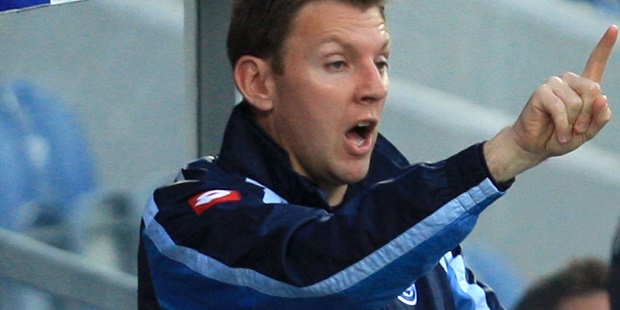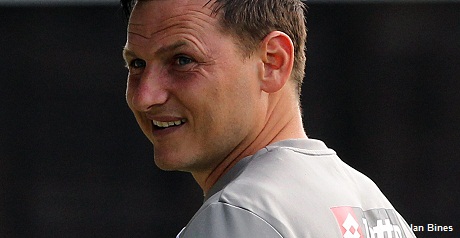Bircham faced challenges at QPR and can leave with his head held high
Few could blame Marc Bircham for accepting an offer from a club and a manager he knows well and has a great deal of affection for.
The time was probably right for him to move on.
He had previously passed up a possible chance to go back to Millwall, where he made more than 100 league appearances as a player, and rejected other opportunities to leave QPR.
In the end, it was the man who took him from The Den to Rangers in 2002 that ended up taking him back there, with Ian Holloway’s recent appointment as Lions boss paving the way for Bircham to return.
It had been on the cards from the moment Holloway was nudged in Millwall’s direction by Kenny Jackett, who left the south London club on good terms last summer and was his right-hand man – and a huge influence on his thinking – during their QPR days.
The link between Holloway, Jackett and Rangers stalwarts like Bircham and Kevin Gallen – whose brother Joe was with Jackett at Millwall and is now his assistant at Wolves – has remained strong.
Bircham did a good job at QPR, initially as youth coach and then after being placed in charge of the newly-formed development squad in 2012.
There were challenges, mainly caused by the neglect of Rangers’ youth and scouting system dating back some years.
Issues also arose from an influx of coaches and other behind-the-scenes staff during the Mark Hughes era.
Hughes is much maligned for QPR’s player acquisitions, which as the then manager he is synonymous with despite others having a significant and unhelpful input; never without his ultimate blessing, but sometimes without him being entirely happy.
But he was certainly directly responsible for major changes away from the first team that were every bit as radical and hurried as the club’s well-publicised transfer dealings, and things didn’t always run smoothly following the addition of ‘his’ people at various levels of the club.
I would like to thank all the QPR fans for their fantastic support over the years and hope for your continued support at Millwall
— Marc Bircham (@marcbircham) January 16, 2014
Bircham ploughed on and was well liked by Hughes’ successor Harry Redknapp.
But the current manager seems – understandably given his and the board’s short-term ambitions – about as bothered about the bigger picture as he would have been had Bircham left to take over as Millwall manager prior to Steve Lomas’ appointment last summer.
From jovial blue-haired midfielder to being a steady influence on QPR’s youngsters, Bircham had come a long way at the club. But he’d perhaps gone as far as he could.
Nothing could have underlined that more than the recent debacle at Everton.
There was no sign of Rangers blooding of youngsters in the FA Cup – now commonplace at other clubs.
Instead, there was the all-too familiar spectacle of experienced, highly-paid players going through the motions.
Would a younger side losing 6-0 have been any worse for the travelling fans to stomach than the team that lost 4-0?
Bircham, keen for Redknapp to give youth a chance when relegation looked certain late last season, and so proud of Michael Harriman’s inclusion at Liverpool on the final day, would have loved more of his Under-21 players to make the step up.
Many fans feel the same judging by comments on Twitter and various messageboards about the decisions to loan out the likes of Harriman and Tom Hitchcock.
The notion that QPR have youngsters capable of playing regularly at Championship level is optimistic – and that’s being polite.

Such is the effect of the club’s failure to invest in important things over a long period, by generally overlooking home-grown players, Redknapp has got it right.
But there’s a time and a place for everything, as they say, and he is well able to mix football and politics. He’s the master of sending out messages to his bosses, the media and others when he wants to.
So, for a cup tie that was hardly a priority, would it not have been the right time to give a nod to the likes of Bircham and development coach Steve Gallen for the tireless work they’ve done by including at least one youngster, to let them know it was all worth it?
And towards the end of last season, with Rangers done for and the football world aware of how some senior ‘pros’ had conducted themselves, would getting one or two more willing youngsters involved not have sent out an appropriate message?
Holloway, incidentally, did precisely that after QPR’s relegation was sealed in 2001.
It’s not all about producing players good enough to be first-team regulars, either.
Had more youngsters featured in those final matches, their Premier League appearances would have substantially added to their market value even if they weren’t good enough for the longer term – something clubs without Rangers’ countless pots of money would have to consider.
Ultimately, there simply hasn’t been enough hard work and investment below the likes of Bircham for him to have been realistically expected to turn out players good enough for the Championship, let alone higher.
The one exception, Raheem Sterling, was lost despite Gallen’s best efforts to stop the club cashing in.
It’s a problem that pre-dates Gallen, Bircham and the Tony Fernandes-fronted regime that currently own QPR and have promised to end the years of neglect.
In the end, Bircham not only did as well as could have been expected, but much better.
It’s not what many fans want to hear, but for the club’s youth products to be playing in the third and fourth tiers is a significant achievement based on their ability and the difficulties that have faced those who’ve nurtured them at QPR. Bircham and Gallen deserve a lot of credit for it.
@WestLondonSport the club should have done more to keep him, need people like him that love this club bringing the young talent through.
— WeAreQPR (@WeAreQPRBlog) January 15, 2014
Not long ago Rangers youngsters struggled to get a club to take them and even struggled to complete a loan spell when they did get a chance to move.
These days there are respected people in the game who will vouch for the ability and professionalism of QPR youngsters they have come across while they’ve been out on loan.
That’s a tribute to Bircham who, despite his reputation as a joker, has always been very serious about instilling pride and professionalism in his players, and a real sense of what it means to represent QPR, as has Steve Gallen and, during his time at the club, Joe Gallen before them.
The strength of the link between what has been seen on the pitch – particularly last season – and the shortage of people at QPR with that attachment to the club, cannot be overstated. One is a direct result of the other.
It’s a huge problem and a consequence of a purging of the club during the chairmanship of Gianni Paladini, whose appointment of Bircham as a youth coach was very much the exception to the rule in terms of how things were done.
It also said much about Bircham’s ambition, his definite ability to manoeuvre and look after himself behind the scenes, which should all stand him in good stead moving forward in the cut-throat world of coaching and management.
Some have argued that he wasn’t given the chance to further his career at Rangers.
Perhaps, but it is also the case that he was parachuted into a great coaching opportunity straight after his playing career ended. Other former QPR men haven’t been anywhere near as fortunate, and Bircham was quickly promoted to a major role despite a relative lack of experience.
At first-team level, the club has been stocked with seasoned coaches. Steve McClaren, for example, made a vital contribution in a short space of time.
Whether, with his straight-talking, demand for high standards and his obvious passion for QPR, Bircham would have been a better choice than Steve Cotterill last season, we’ll never know.
What we do know, judging by the messages he has been swamped with on Twitter, is that he remains a hugely popular figure among a great many R’s fans, who wish him well.
They see him as someone who has always done his best for QPR, and his departure as a sad loss for the club.
He has. And it is.
Follow West London Sport on Twitter
Find us on Facebook


16/01/2014 @ 5:44 pm
Best wishes to Bircham and hope he does well.
I cant see how chucking some of the kids in against Everton would help though. If they are not ready, as you say, for even the championship then getting stuffed 8-0 by one of the best teams in the country wouldn’t help them and might leave some scars too.
Some responses might see ‘the bigger picture’ but people can be very harsh just look at Twitter and imagine some of that bile aimed unfairly at Birchy and the kids who to their credit are not yet thick skinned. So playing the first team was right imo – if there was a beating to be had at Everton then better to send the men to take it, not the kids.
Unfortunately, bad things come easy but good things take time. But the results and spirit of the current squad overall suggest to me that things are at least no longer going backwards.
16/01/2014 @ 4:39 pm
Very well summed up, and a nice overview on the Bircham/QPR dynamic. Well done also for trying to quell some of the rabid anti-Hughes stuff that has been around for some time now. I feel history may re- align the Hughes/Redknapp comparisons somewhat!